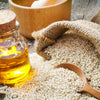The tasty, mineral-rich nut that cuts heart disease risk

Cashew nuts, botanically classified as Anacardium occidentale, originally hail from Brazil - although they are now cultivated throughout Southeast Asia and Africa. These golden-brown morsels seem perfectly designed to please the palate with their buttery, sweetish taste and crunchy, satisfying texture.
But cashews offer more than just a flavorful snack. Researchers say that important nutrients in these savory tree nuts allow them to deliver generous gifts to the coronary, skeletal, and metabolic systems. Let’s take a closer look at what cashew nuts “bring to the table” in terms of health benefits. (We already know they’re delicious!)
Cashews have a superb nutritional profile
An analysis of the contents of cashew nuts yields a snapshot of near-perfect nutrition, with well-balanced amounts of plant-based protein, dietary fiber, and healthy fats. And, when it comes to providing essential minerals, cashews mean business. A one-ounce serving contains a whopping 31 percent of the adult recommended daily amount of copper, essential for bone, muscle, and immune system health. Cashews are second only to beef and seafood as a source of this important mineral, and many dietitians advise eating cashews as a good way for vegans and vegetarians to meet their copper needs.
Gluten-free cashews can also give an “assist” to those with celiac disease, who are at heightened risk of copper deficiency. The same one-ounce serving of cashews delivers almost a quarter of the daily value for manganese - also needed for immune health - and 10 percent of the RDA for iron, important for producing red blood cells. Finally, an ounce of cashews provides a generous 20 percent of the daily value for magnesium, indispensable for protecting bone health and preventing debilitating fractures in older adults. (With 10 million Americans over 50 suffering from osteoporosis, the importance of staying “topped up” on magnesium and other bone-friendly minerals can’t be overstated!)
Support balanced blood sugar and healthy weight with cashews
Cashew nuts are a good source of fiber, which can help to stabilize blood sugar and prevent harmful after-meal “spikes.” In fact, despite their sweet, rich taste, the glycemic load for an ounce of cashew nuts is a modest 3. So it’s not surprising that cashew consumption by people with diabetes is linked with improved insulin control and a better balance between HDL and LDL cholesterol. (Nuts, in general, are believed to support metabolic health, with some integrative healthcare providers advising eating a handful a day to promote healthy weight and help prevent type 2 diabetes.)
Cashew nuts - at 157 calories an ounce - are not a low-calorie food but “earn” their caloric investment by providing a healthy mix of fiber, protein, and fat, along with generous amounts of minerals and vitamins. Good to know: While a one-ounce serving (about 18 cashews) contains a hefty 12 grams of fat, most consist of heart-healthy monounsaturated and polyunsaturated fatty acids. The moral of the story: cashew nuts, in moderation, may help regulate blood sugar - and aren’t necessarily a roadblock on a successful weight loss journey. If you have diabetes, your integrative doctor or nutritionist can advise you on eating tree nuts.
Promote a healthy heart with cashews
In addition to providing a slew of minerals, cashews are rich in vitamin K, with an ounce providing 12 percent of the daily value for adults. Recent research has shown that vitamin K can help discourage heart disease by preventing atherosclerotic plaque formation in artery walls. And that’s not all. A recent study published in Nutrients showed that eating 28 to 64 grams of cashews (around one to two ounces) daily decreased harmful LDL cholesterol by 24 percent. Finally, some studies have suggested that cashews can increase healthy HDL cholesterol while lowering blood pressure. The tasty truth is: studies suggest that frequent consumption of cashews and other nuts may lower the risk of heart disease.
Elevate simple dishes and snacks with the elegant cashew nut
There are lots of ways to incorporate cashew nuts into your diet. Sprinkle chopped cashews over salads, add them to yogurt or oatmeal, pop them into stir-fries or grind and use as a crunchy coating for flounder, salmon, or eggplant. You can also serve them with apple slices and mellow cheese, like Edam, Havarti, or cottage cheese. Or, balance their savory taste with the sweetness of fresh cherries or grapes. Cashew butter and cashew milk are two other ways to calm a cashew craving.
While not as common as reactions to other tree nuts and peanuts, allergic reactions to cashews have been reported, with symptoms ranging from mild to potentially life-threatening anaphylaxis. If you suspect you have an allergy to any tree nuts, you should avoid cashews.
By the way, cashews billed as “raw” are not actually raw but unroasted. Dry roasted cashews are thought to have more antioxidant value than unroasted ones, but avoid buying heavily salted ones made with added sugars or coated with sugary ingredients.
When stored in an airtight container, cashews will stay fresh for up to three months in the cupboard, six months in the refrigerator, and up to a year in the freezer. There’s plenty of heart-healthy goodness stored in these little nuggets! Cashews in moderate amounts make a great addition to a healthy daily diet.
Sources for this article include:






